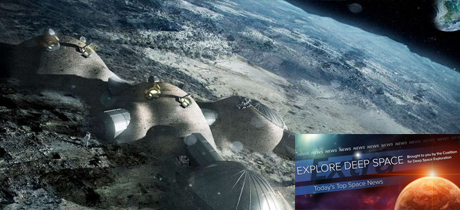In Today’s Deep Space Extra… Future human activity on the lunar surface could mean resources for Earth as well as scientific discovery, according to Apollo 17’s Harrison Schmitt. NASA turns to industry for help with a Deep Space Gateway (DSG) power and propulsion module.
Human Space Exploration
Face to face with Harrison Schmitt: Space and the challenge for America
Albuquerque Journal (12/4): Apollo 17, the most recent journey to the moon by human explorers, launched 45 years ago this Thursday. Harrison Schmitt, the only scientist to make the journey, joined fellow NASA astronaut and mission commander, the late Gene Cernan, for three days on the lunar surface. Among the reasons to return to the moon, says Schmitt, is the possibility of mining Helium-3, a fusion power source for the generation of terrestrial electricity.
NASA evaluates EM-2 launch options for Deep Space Gateway (DSG) PPE
Coalition Members in the News – Boeing, Lockheed Martin and Orbital ATK
NASAspaceflight.com (12/4): Among NASA’s efforts to develop its proposed Deep Space Gateway (DSG), a lunar orbiting human tended outpost, is an assessment of whether the gateway’s power and propulsion element could be launched on the second joint test flight of the agency’s Space Launch System (SLS) and Orion crew capsule. The agency is spending $2.4 million on assessments with work divided among Boeing, Lockheed Martin, Orbital ATK, Sierra Nevada Corp. and Space Systems/Loral. NASA proposes to assemble the DSG in the 2020s.
NASA expects commercial crew providers to achieve safety requirements
Coalition Member in the News – Boeing
Space News (12/4): Boeing’s CST-100 Starliner and SpaceX’s crewed Dragon are expected to meet or come close to risk levels established by NASA’s Commercial Crew Program for the launching of astronauts to and from the International Space Station, agency representatives tell the NASA Advisory Panel for Human Exploration and Operations and the NASA Safety Council. That risk level is no more than a 1/270 chance of death or serious injury to an astronaut assigned to launch and land aboard the two space capsules. Both companies plan to conduct uncrewed and crewed test flights next year.
Space Science
A ‘Martian’ first: Earthworms born in mock Mars soil
Space.com (12/4): Scientists in the Netherlands have succeeded in growing earthworms in a NASA produced Mars soil simulant. The demonstration offers hope that human explorers might be able to grow food for survival on the red planet.
Universe Today (12/4): The European Southern Observatory’s Very Large Telescope (VLT) in Chile has managed to extract new data from the Hubble Deep Field, an observation of some of the universe’s oldest galaxies, about 10,000 star systems that date back 13 billion years. The VLT has discovered star systems hidden from Hubble’s view to deepen an understanding of how they formed and evolved.
Other News
Seeking regulatory certainty for new space applications
Coalition Members in the News – Astrobotic, Lockheed Martin, and Orbital ATK
The Space Review (12/4): During recent gatherings of commercial space experts, participants urged the U.S. government to establish some clarity in the regulation of new private space ventures. Currently, rocket launches and re-entries are regulated by the FAA, but not the activities in between. NOAA watches over weather satellites and the FCC over communications satellites. But there’s a gap in the regulation of nontraditional commercial activities, other than the guidelines spelled out in the 50-year-old Outer Space Treaty. Entrepreneurs worry the gap could prompt commercial companies to move to Luxembourg or the UAE, which are taking a more defined positions.
Establishing a European new space industry
The Space Review (12/5): Europe is eagerly embracing “new space,” writes TSR editor Jeff Foust. But there are challenges: A source of private sector investment capital and a mindset receptive to innovation at the expense of established ways.
Turkey reportedly laying basis for satellite launch program
Quwa (12/4): Turkey is preparing to develop a launch vehicle capability to place satellites in orbit and end its reliance on foreign launch services.

